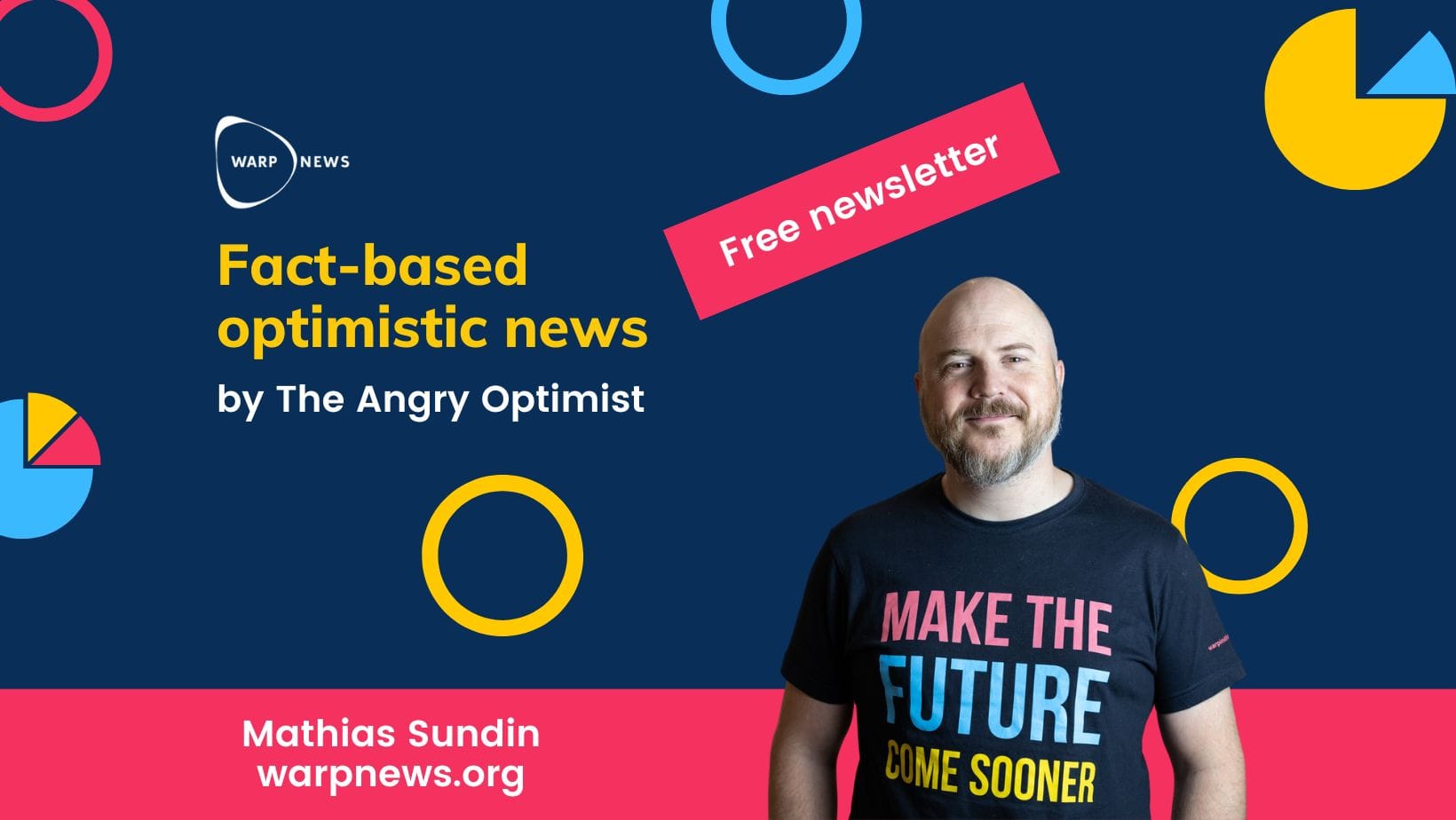
💧 California completely drought-free for the first time in 25 years
California has no dry areas for the first time since 2000 according to the US Drought Monitor. Heavy winter rains have filled the state's reservoirs far above historic averages.
⚗️ Amazon buys copper produced with microorganisms in new climate-friendly process
The process uses microorganisms to extract copper from ore that previously often became waste, eliminating the need for traditional smelters and refineries. The technology can strengthen domestic copper supply without waiting for permits for new mines, a process that normally takes many years.
👩⚕️ Huntington's disease has been successfully treated for the first time
A gene therapy has for the first time been shown to slow Huntington's disease by 75 percent after three years in a clinical trial. The results provide proof that the disease can be treated, opening possibilities for other neurodegenerative conditions as well.
💡 Warp News #307
🌎 Growth without increased emissions now a reality in most countries. 🦟 Scientists succeed in creating mosquitoes that block malaria. 📊 Africa expected to have higher economic growth than Asia.
🔭 Google's former CEO is funding four new telescopes to be completed within four years
Eric and Wendy Schmidt are investing in building four large telescopes, including a space telescope that will rival Hubble. One of the telescopes, Argus Array, consists of 1,200 small telescopes that together can photograph the entire northern sky in a few minutes.
📚 The best books I read in 2025
A timely history book, one about what everyone knows that everyone knows, one about Lego, one about multiple Jesuses, one about the most famous Mafia movie and one about abundance.
👁️ Number of people needing treatment for trachoma has decreased by 94 percent
Trachoma is the world's leading infectious cause of blindness. The number of people requiring interventions against trachoma has dropped from 1.5 billion to 97.1 million since 2002. Over 1.1 billion doses of antibiotics have been donated to combat the disease.
📊 Africa expected to have higher economic growth than Asia for the first time
The IMF predicts that sub-Saharan Africa will grow by 4.4 percent in 2026, compared to Asia's 4.1 percent. Africa's stable outlook is supported by a weak dollar, lower debt pressure and high commodity prices for gold and copper.
🌏 Fewer people than ever before say they are living truly bad lives
33 percent of the world’s adults are now classified as “thriving” according to Gallup’s Wellbeing Index—the highest level in more than a decade. The rise in wellbeing is visible across all demographic groups. Men and women, young and old alike now rate their lives more positively than before.
☀️ Renewable energy is the scientific breakthrough of the year – surpasses coal as power source worldwide
The journal Science has named the advance of renewable energy as the breakthrough of the year after solar and wind power surpassed coal as a power source globally. In 2004, it took a full year to install 1 gigawatt of solar power capacity globally – today twice that amount goes online every day.
🌎 Study: Economic growth without increased emissions now a reality in most countries
Countries representing 92 percent of the global economy have now decoupled consumption-based carbon emissions from GDP growth. China's emissions have plateaued over the past 18 months and may have peaked.
🦟 Scientists succeed in creating mosquitoes that block malaria
Researchers in Tanzania have for the first time in Africa created genetically modified mosquitoes that prevent the malaria parasite from developing. The modified mosquitoes contain naturally occurring molecules from frogs and bees that effectively stop the parasite Plasmodium falciparum.
💡 Warp News #306
🛫 Airplane contrails warm the climate less than scientists thought. 🎗️ New method creates cancer-fighting immune cells directly in the body. 🐺 North America's large carnivores have recovered.
🐘 Number of African forest elephants revised upward by 16 percent
A new report estimates there are 135,690 African forest elephants, an upward revision of 16 percent compared to 2016 figures. Gabon is home to 66 percent of the global population of African forest elephants.
📉 Global carbon dioxide emissions may be close to reaching their peak
Data on greenhouse gas emissions shows a decline during the first months of last year compared to the same period the year before. Solar power and electric vehicles are growing rapidly in several major economies, reducing dependence on fossil fuels.
📚 Top Reads
We're honored to present these top reads from world-class writers, who contribute to Warp News because they believe in our mission of spreading fact-based optimism all over the world.
🆙 Warp Levels - an idea to level up humanity
Humanity is doing the high jump without a bar. We have no goal. With Warp Levels, we determine what the next level for humanity should contain, so we can level up and make progress faster.
📚 Kevin Kelly: Focus on the biggest opportunities, not the biggest problems
We talk about some of the 450 advice in his new book, but also about his new project: Protopia - the hundred-year desirable future. And Kevin Kelly give advice for how Warp News should grow faster: "Wrap it around people and their dreams."
💡 A new mindset for humanity can impact billions of people now and in the future
If we succeed in giving humanity more optimism about the future, it will not only affect those living now but also all generations and billions of people who will live in the future.
💰 Wall Street legend: “Pessimists sound smart – optimists make money”
Jim O'Shaughnessy is a legendary investor on Wall Street. He shares what he thinks is the biggest opportunity for the future and explains how the world is going through a great reshuffle.
🔋 Northvolt and the benefit of understanding the future
The story of Peter Carlsson and Northvolt teaches us two lessons: You need to understand the future to see all the possibilities, and you must be a fact-based optimist to grab them.
💡 David Deutsch: Optimism, Pessimism and Cynicism
With so much progress in the world, how can pessimism still be widespread? It is because of cynicism, denying that “so-called-progress” is progress, argues David Deutsch, professor at Oxford University and one of the world's leading intellectuals on optimism.









































